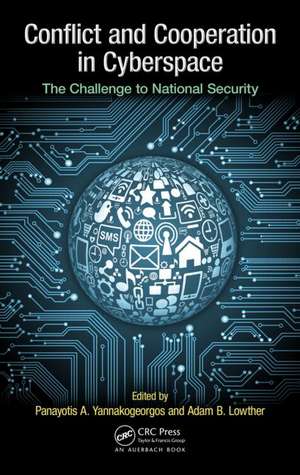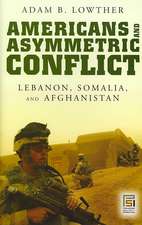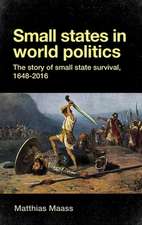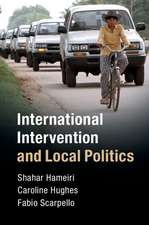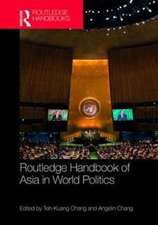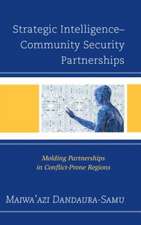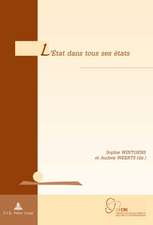Conflict and Cooperation in Cyberspace: The Challenge to National Security
Editat de Panayotis A Yannakogeorgos, Adam B. Lowtheren Limba Engleză Hardback – 22 iul 2013
The discussion begins with thoughtful contributions concerning the attributes and importance of cyberspace to the American way of life and global prosperity. Examining the truths and myths behind recent headline-grabbing malicious cyber activity, the book spells out the challenges involved with establishing a robust system of monitoring, controls, and sanctions to ensure cooperation amongst all stakeholders. The desire is to create a domain that functions as a trusted and resilient environment that fosters cooperation, collaboration, and commerce. Additionally, the book:
- Delves into the intricacies and considerations cyber strategists must contemplate before engaging in cyber war
- Offers a framework for determining the best ways to engage other nations in promoting global norms of behavior
- Illustrates technologies that can enable cyber arms control agreements
- Dispels myths surrounding Stuxnet and industrial control systems
Outlining the larger ethical, legal, and policy challenges facing government, the private sector, civil society, and individual users, the book offers plausible solutions on how to create an environment where there is confidence in the ability to assure national security, conduct military operations, and ensure a vibrant and stable global economy.
Preț: 825.84 lei
Preț vechi: 1032.30 lei
-20% Nou
Puncte Express: 1239
Preț estimativ în valută:
158.02€ • 164.99$ • 130.78£
158.02€ • 164.99$ • 130.78£
Carte tipărită la comandă
Livrare economică 04-18 aprilie
Preluare comenzi: 021 569.72.76
Specificații
ISBN-13: 9781466592018
ISBN-10: 146659201X
Pagini: 360
Ilustrații: 13 black & white illustrations, 7 black & white tables
Dimensiuni: 156 x 234 x 25 mm
Greutate: 0.68 kg
Ediția:New.
Editura: CRC Press
Colecția CRC Press
ISBN-10: 146659201X
Pagini: 360
Ilustrații: 13 black & white illustrations, 7 black & white tables
Dimensiuni: 156 x 234 x 25 mm
Greutate: 0.68 kg
Ediția:New.
Editura: CRC Press
Colecția CRC Press
Public țintă
Anyone interested in the field of cyber warfare/cyber operationsor looking to expand a cyber security career, including cyber commanders, information operations officers, information security/assurance professionals, cyber security consultants, cyber strategists, military members (J2, J3, J6, J9 types), SOC/NOC security analysts, network security engineers, penetration testers, auditors, government officials, and security engineers.Cuprins
Introduction. KEY CONSIDERATIONS. The Future of Things Cyber. What’s Wrong with Cyberspace? Cyberspace Security Considerations.Two, Maybe Three Cheers for Ambiguity. The Essential Features of an Ontology for Cyber Warfare. Cyber Defense as Environmental Protection: The Broader Potential Impact of Failed Defensive Counter Cyber Operations. TECHNOLOGY. Challenges in Monitoring Cyber Arms Compliance. Digital Policy Management: A Foundation for Tomorrow; National Security Agency Enterprise Service Division-Identity and Access Branch On Mission Assurance. Stuxnet: A Case Study in Cyber Warfare. Digital Dissent: The Internet and Dissent in Authoritarian States. ETHICS, LAW, AND POLICE. Can There be an Ethical Cyber War? Perspectives for Cyber Strategists on Cyber Law for Cyber War. A New Normal? The Cultivation of Global Norms as Part of a Cyber Security Strategy. The Prospects for Cyber Deterrence: American Sponsorship of Global Norms for Cyberspace. Cyber Sovereignty. American Cybersecurity Triad: Government-wide Integration, Technological Counterintelligence, and Educational Mobilization.
Recenzii
Facilitated by the exceptional handiwork of the editors, this book significantly advances the effort to achieve common ground in the debates regarding cyberspace. National security and cyber-related professionals will find it equally useful in their work.
—Lt. Gen Bob Elder, USAF (Retired)
Facilitated by the exceptional handiwork of the editors, this book significantly advances the effort to achieve common ground in the debates regarding cyberspace. National security and cyber-related professionals will find it equally useful in their work.
—Lt. Gen Bob Elder, USAF (Retired)
In this wide-ranging anthology that encompasses expert viewpoints from military, civilian, and private sector contributors, the editors seek to provide a broad framework of issues to be considered. Rather than provide definitive answers (all of the contributors readily admit that none exist), the contributors state that in order to attain the right answers, we must first ask the right questions. Over the course of the book, the authors put forth a common set of concerns to frame the issue at hand. ... The authors undertake a study of how to apply cyber law to cyber war, warning that allowing the Intelligence Community and the military to assist in the defense of privately owned networks may lead to legal and political consequences. They also grapple with the environmental aspects of cyber: a cyber-attack against an industrial control system (energy, nuclear, chemical, or waste management), would lead to massive environmental damage, staggering economic losses, and cause (potentially) rampant public health hazards.
This well-written tome brings together a cast of eminent thinkers, military strategists, academics, cyber specialist, and policy experts to examine cyber challenges for U.S. and international diplomats and decision makers. While it keeps its emphasis on policy-relevant solutions, it maintains the need for a common core of concepts to better define, codify, and approach this new concept that will be with us for years to come. It main utility is in the questions raised, vice answers provided. The book would be of most use for those attempting to better understand cyberspace and possible policy avenues for the future.
—Mark Roberts, Security Consultant, writing in the Journal of Strategic Security, Volume 7, Number 1, Article 8
—Lt. Gen Bob Elder, USAF (Retired)
Facilitated by the exceptional handiwork of the editors, this book significantly advances the effort to achieve common ground in the debates regarding cyberspace. National security and cyber-related professionals will find it equally useful in their work.
—Lt. Gen Bob Elder, USAF (Retired)
In this wide-ranging anthology that encompasses expert viewpoints from military, civilian, and private sector contributors, the editors seek to provide a broad framework of issues to be considered. Rather than provide definitive answers (all of the contributors readily admit that none exist), the contributors state that in order to attain the right answers, we must first ask the right questions. Over the course of the book, the authors put forth a common set of concerns to frame the issue at hand. ... The authors undertake a study of how to apply cyber law to cyber war, warning that allowing the Intelligence Community and the military to assist in the defense of privately owned networks may lead to legal and political consequences. They also grapple with the environmental aspects of cyber: a cyber-attack against an industrial control system (energy, nuclear, chemical, or waste management), would lead to massive environmental damage, staggering economic losses, and cause (potentially) rampant public health hazards.
This well-written tome brings together a cast of eminent thinkers, military strategists, academics, cyber specialist, and policy experts to examine cyber challenges for U.S. and international diplomats and decision makers. While it keeps its emphasis on policy-relevant solutions, it maintains the need for a common core of concepts to better define, codify, and approach this new concept that will be with us for years to come. It main utility is in the questions raised, vice answers provided. The book would be of most use for those attempting to better understand cyberspace and possible policy avenues for the future.
—Mark Roberts, Security Consultant, writing in the Journal of Strategic Security, Volume 7, Number 1, Article 8
Notă biografică
Panayotis "Pano" A. Yannakogeorgos is a research professor of Cyber Policy and Global Affairs at the Air Force Research Institute. His expertise includes the intersection of cyberspace, national security, and military operations; cyber international relations; cyber arms control; violent non-state actors; and Eastern Mediterranean studies. He has recently authored articles and chapters including "Internet Governance and National Security" (Strategic Studies Quarterly), "Challenges in Monitoring Cyber Arms Control (Journal of Information Warfare and Terrorism), "Pitfalls of the Private-Public Partnership Model" in Crime and Terrorism Risk: Studies in Criminology and Criminal Justice (Routledge, New York), and "Cyberspace: The New Frontier and the Same Old Multilateralism" in Global Norms: American Sponsorship and the Emerging Pattern of World Politics (Palgrave Macmillan, New York). He has also published in The Atlantic, The National Interest, and The Diplomat.
Prior to his current position, Yannakogeorgos taught graduate-level courses on globalization, security, and intelligence at Rutgers University’s Division of Global Affairs (Newark, New Jersey), where he also served as senior program coordinator, and led the Center for the Study of Emergent Threats in the 21st Century. He has participated in the work of global cybersecurity bodies including the High Level Experts Group of the Global Cybersecurity Agenda of the International Telecommunications Union. In 2006 he served as an advisor within the United Nations Security Council on issues related to nuclear nonproliferation, the Middle East (including Iran), Al-Qaida, and Internet misuse. He holds a PhD and MS in global affairs from Rutgers University, and an ALB in philosophy from Harvard University (Cambridge, Massachusetts).
Adam Lowther (BA, Arizona State University; MA, Arizona State University; PhD, University of Alabama) is a research professor at the Air Force Research Institute (AFRI), Maxwell Air Force Base (Montgomery, Alabama). His principal research interests include deterrence, nuclear weapons policy, airpower diplomacy, and terrorism.
Lowther is the editor of Deterrence: Rising Powers, Rogue Regimes, and Terrorism in the Twenty-First Century (Palgrave Macmillan, New York), co-editor of Terrorism’s Unanswered Questions (Praeger Security International, Westport, Connecticut), and the author of Americans and Asymmetric Conflict: Lebanon, Somalia, and Afghanistan. He has published in the New York Times, Boston Globe, Joint Forces Quarterly, Strategic Studies Quarterly, and elsewhere.
Prior to joining AFRI, Lowther was an assistant professor of Political Science at Arkansas Tech University and Columbus State University. Early in his career Lowther served in the US Navy aboard the USS Ramage (DDG-61). He also spent time at CINCUSNAVEUR-London and with NMCB-17.
Prior to his current position, Yannakogeorgos taught graduate-level courses on globalization, security, and intelligence at Rutgers University’s Division of Global Affairs (Newark, New Jersey), where he also served as senior program coordinator, and led the Center for the Study of Emergent Threats in the 21st Century. He has participated in the work of global cybersecurity bodies including the High Level Experts Group of the Global Cybersecurity Agenda of the International Telecommunications Union. In 2006 he served as an advisor within the United Nations Security Council on issues related to nuclear nonproliferation, the Middle East (including Iran), Al-Qaida, and Internet misuse. He holds a PhD and MS in global affairs from Rutgers University, and an ALB in philosophy from Harvard University (Cambridge, Massachusetts).
Adam Lowther (BA, Arizona State University; MA, Arizona State University; PhD, University of Alabama) is a research professor at the Air Force Research Institute (AFRI), Maxwell Air Force Base (Montgomery, Alabama). His principal research interests include deterrence, nuclear weapons policy, airpower diplomacy, and terrorism.
Lowther is the editor of Deterrence: Rising Powers, Rogue Regimes, and Terrorism in the Twenty-First Century (Palgrave Macmillan, New York), co-editor of Terrorism’s Unanswered Questions (Praeger Security International, Westport, Connecticut), and the author of Americans and Asymmetric Conflict: Lebanon, Somalia, and Afghanistan. He has published in the New York Times, Boston Globe, Joint Forces Quarterly, Strategic Studies Quarterly, and elsewhere.
Prior to joining AFRI, Lowther was an assistant professor of Political Science at Arkansas Tech University and Columbus State University. Early in his career Lowther served in the US Navy aboard the USS Ramage (DDG-61). He also spent time at CINCUSNAVEUR-London and with NMCB-17.
Descriere
Conflict and Cooperation in Cyberspace brings together some of the world’s most distinguished military leaders, scholars, cyber operators, and policymakers in a discussion of current and future challenges that cyberspace poses. Focusing on policy-relevant solutions, it offers a well-reasoned study of how to prepare for war, while attempting to keep the peace in the cyberspace domain. Examining the truths and myths behind recent headline-grabbing malicious cyber activity, the book spells out the challenges involved with establishing a robust system of monitoring, controls, and sanctions to ensure cooperation amongst all stakeholders.
